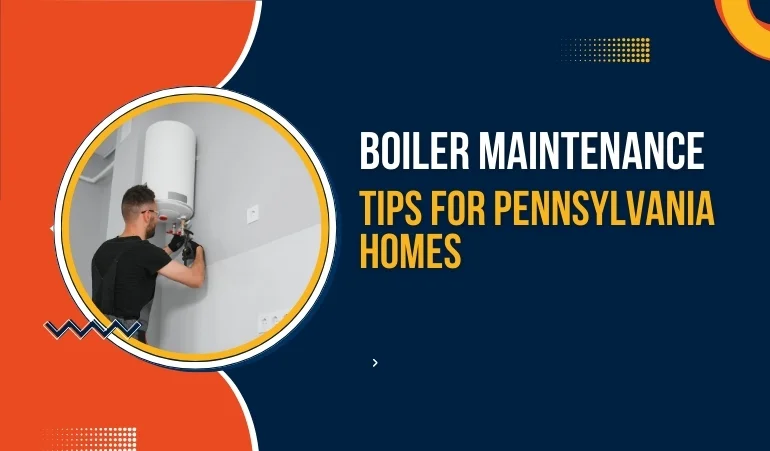Contact Info

Winters in Pennsylvania bring extreme chills and snow. According to the World Climate Report, an average of 19°F was recorded in January. It necessitates the presence of a functional and high-performing boiler in every home in the state. Due to the harsh climate and high strain on the equipment, there are increased chances of breakdowns and residential boiler repair needs. But if you keep a close eye on the maintenance, you can prevent problems.
This guide is specifically compiled to educate our beloved homeowners in Pennsylvania about the maintenance of their boilers. It includes the proven tips and tactics, confirmed by our certified experts at Lehigh HVAC.
If you live in Pennsylvania and you have been using boilers for a few years, you must be looking for a solution to prevent residential boiler repairs in PA. This is precisely what you can get through regular maintenance. In our experience at Lehigh HVAC, we have seen the boiler units working optimally without any breakdowns for even years. The sole reason behind this was timely boiler repair and maintenance. That’s why we focus on the maintenance, and in fact, we explain the complete roadmap of appliance maintenance after residential heating installation in PA. In short, a well-maintained boiler works efficiently, lasts longer, and doesn’t fail when you need it the most.
We definitely recommend hiring a professional for complete boiler maintenance. However, if you possess the right knowledge, you can verify whether the work is done correctly. Additionally, it will help you resolve minor issues on your own. Let’s explore the maintenance guide below:
Starting with the very basics, cleaning is necessary for boiler maintenance. It is sometimes neglected, but it is an essential step to prevent problems from escalating. Add boiler cleaning to your routine tasks and make sure the exterior of your boiler is always clean and clear. Turn your boiler off, wait for it to be cool, and then clean it carefully with any of your routine cleaning equipment.
No matter where you live in Pennsylvania, you must have sometimes noticed uneven heating in various parts of your home. This is because of the trapped air in the radiator or the associated pipelines with it. The best and direct solution for this issue is bleeding the radiator where there is reduced heating. Open your radiator’s valve and let the trapped air escape. Now you have restored your properly performing boiler.
Keep a close eye on the pressure of your boiler system. The normal pressure for many units is around 12–15 psi when the system is cool; ask your manufacturer for the exact numbers. This number should be kept in a close range for best results. Low pressure can’t circulate the warm water effectively through the building, while high pressure puts an undue strain on the entire heating appliance. Raise or lower the pressure to the normal range with the help of your local technicians.
You might have heard strange noises from your boiling appliance. This is often due to sediment buildup in the radiators and associated components. The direct approach to combat this issue is to flush the system periodically. It removes all the sediments, rust, sludge, and debris. Additionally, clean the suitable parts of the boiler with the approved cleaning agent. Once you are done with all this, you have prepared your system for efficient operation all season long.
You might have seen exhaust fumes from the boilers, which have not been serviced for one or two years. These are not ordinary fumes; they often contain carbon monoxide, one of the most dangerous gases for human health. Install the CO alarms near your boiler and preferably at each level of your home so you can immediately get notified when there is a CO emergency. For CO prevention, explore the CDC’s CO resources and find practical tips.
Keep checking the quality and performance of various parts such as valves, pumps, thermostats, and the expansion tank. Consider a replacement immediately after you detect significant damage. A timely replacement is always better and more inexpensive than an emergency boiler repair in PA in a cold snap. Modern components offer higher durability and come with greater warranties.
Regular and ongoing inspection is the key to effective maintenance. Schedule seasonal inspection or boiler repair services PA from a professional company before the cold hits Pennsylvania. If you ignore this, you will be pushed towards a frustrating residential water heater repair in PA. The technicians will inspect each and every component of the unit, conduct advanced diagnostic tests, and capture potential issues at earlier stages before they escalate.
Boiler maintenance is an essential step to keep the unit performing at its best. The maintenance for a boiler system is almost similar to other HVAC tune-ups and servicing, with only some additional tasks. Keep checking the components regularly, and take a special focus on the safety hazards. Keep the pressure under control, moving parts lubricated, and the exterior of the boiler well-cleaned. Additionally, schedule seasonal inspection service from a professional company to detect issues earlier.
If you find it difficult to monitor your boiler’s maintenance closely, Lehigh HVAC is here to help. With our annual maintenance plan, you can have peace of mind that your warmth partner will be in its best position all winter long. For all this, we charge nothing but a few dollars. Contact us today at 484-961-7044 to learn more about the plans.